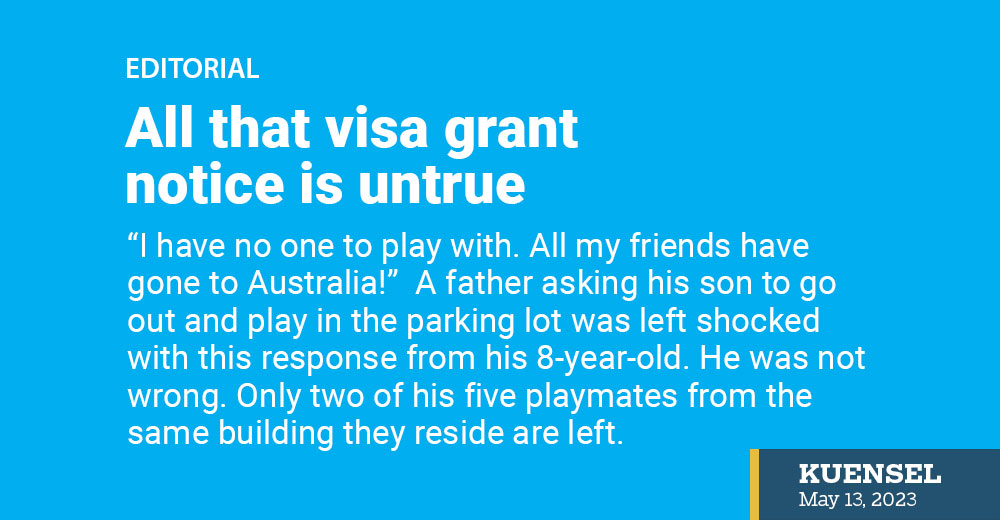“I have no one to play with. All my friends have gone to Australia!”
A father asking his son to go out and play in the parking lot was left shocked with this response from his 8-year-old. He was not wrong. Only two of his five playmates from the same building they reside are left. The next question hit him harder. “When are we going, Apa?”
With thousands of Bhutanese leaving for abroad, mostly to Australia, the peer pressure is increasing. It is from parents, friends, colleagues, neighbours and now children, as they see friends and classmates suddenly leave.
The visa grant notices that flood social media constantly remind, to the extent even if falsely, that everybody is getting a visa to go to Australia to study or work, and that it is easy. It has become like a competition among education consultancies to show who is sending more people to Australia to get more clients. It is a business and an effective advertising strategy.
Recently, at a meeting of education consultancies and placement firms, proprietors agreed to not advertise, on social media, those who were granted visas. Calling it irresponsible advertising considering the number of people leaving the country, they agreed to not promote their businesses. Not all agreed and we still see smiling pictures with congratulatory notes.
The decision of those who agreed to not promote their business should be lauded. It is becoming a concern. For instance, not all are on study or dependent visas, the most preferred, as it is a gateway to extended stay and a permanent residence in Australia. Some are on shorter tourist visas. But this is not specified.
Consultancy firms have a huge responsibility. We can surmise that for every visa granted there are three rejected. Claims of getting a visa in two or three days are an exception. We know what it takes to decide and prepare to go to Australia. Some spend their entire savings. Others borrow and a few sell what they have in the hope of a better life.
Consultancies should share the realities of living and working in Australia. The difficulty of getting a job, a place to stay or staying in cramped houses, w and the reality of crashing in sitting rooms and camping outdoors or sleeping in cars, even if it is only among a few, are not talked about openly. Visitors to the education fair today should ask uncomfortable questions.
That the consultancies are forming an association is a good start. With a mandate to ensure that any Bhutanese seeking advice for education outside of Bhutan have access to correct and up-to-date and not getting cheated by sub agents in Nepal or India, is a service worth the sacrifice. Some Bhutanese are sent to universities in Australia through agents in Nepal or India. This puts both Bhutanese and the local consultancies in jeopardy. The big players (consultancies) may have direct linkages with universities, but there are many new players in the market who are competing to send Bhutanese to Australia. Some rely on agents outside the country.
We cannot stop people leaving, but we can ensure that they get worth the sacrifice, by giving them the right information. All consultancies coming under a formal association to help Bhutanese is a welcome decision.


